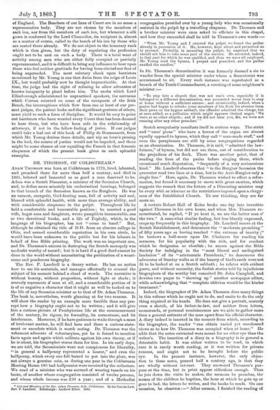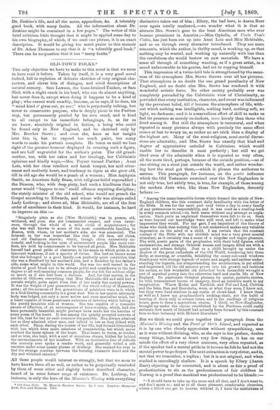DR. THOMSON, OF COLDSTREAM.*
ADAM Thomson. was born at Coldstream in 1779, lived, laboured, and preached there for more than half a century, and died in 1861, beloved and lamented as so good a man deserved to be. Adam was a Scotch Dissenter, a minister of the Secession Church, and, to define more minutely his ecclesiastical bearings, belonged to that branch of the Secession known as the Burghers. He was an earnest, energetic, God-fearing man, full of activity and zeal, blessed with splendid health, with more than average ability, and with considerable eloquence in the pulpit. Throughout life he held a comfortable and honourable position ; he married a good wife, begat sons and daughters, wrote pamphlets innumerable, one or two devotional books, and a life of Toplady, which, in the language of his biographer, ha a not "come to hand." But, although he obtained the title of D.D. from an obscure college in Ohio, and earned considerable reputation in his own circle, he would have been unknown to the public but for his labours in behalf of free Bible printing. The work was an important one, and Dr. Thomson's success in destroying the Scotch monopoly was no doubt worthy of record ; but it is hard if a good deed cannot be done in the world without necessitating the publication of a weari- some and ponderous biography.
The Rev. P. Landrell is a dreary writer. He has no notion how to use his materials, and manages effectually to conceal the subject of his memoir behind a cloud of words. The narrative is without beauty, without proportion, without light or shade ; it scarcely represents le man at all, and a considerable portion of it is of so negative a character that it might as well be tacked on to the life of any Secession minister as to that of Dr. Adam Thomson. The book is, nevertheless, worth glancing at for two reasons. It will show the reader by an example more forcible than any pre- cept how a biography ought not to be written ; and it will give him a curious picture of Presbyterian life at the commencement of the century, its rigour, its formality, its earnestness, and its intolerance. Moreover, if he have patience to wade through a mass of irrelevant matter, he will find here and there a curious state- ment or anecdote which is worth noting. Dr. Thomson was the vehement advocate of voluntaryism, yet he is forced to mention facts again and again which militate against his own theory, or if he is silent, his biographer states them for him. In his early days, we are told, the Secessionists were not conspicuous for liberality, "in general a halfpenny represented a hearer," and even the halfpenny, which every one felt bound to put into the plate, was not always a genuine coin, as during one year in the Coldstream Meeting House 180 bad halfpennies were received by the collectors. We read of a minister who was accused of wearing tassels on his boots, of another whose congregation consisted of twelve persons, and whose whole income was £30 a year ; and of a Methodist • Life and Ministry of the Reo. Adam Thomson, D.D., Coldstream. By his Son-in-Law, Elev. P. Landrell. Edinburgh : Andrew Elliot 1869. congregation presided over by a young lady who was occasionally assisted in the pulpit by a travelling chapman. Dr. Thomson and a brother minister were once asked to officiate in this chapel, and how they succeeded shall be told in Thomson's own words :— "When Mr. Young and I entered the pulpit we found the pedlar already in possession of it. He, however, kept silent and permitted us to proceed. Probably, in mounting the pulpit, he expected that we should ask him to take some part of the service. He attended, indeed, to that part for which he was qualified, and thus we were all employed. Mr. Young read the hymns, I prayed and preached, and the pedlar snuffed the candles."
In Dr. Thomson's denomination it was formerly deemed a sin to wander from the special minister under whom a Secessionist was accustomed to sit. Every such instance was reprobated as a breach of the Tenth Commandment, a coveting of some neighbour's minister :— "To step into a church that was not one's own, especially if it belonged to a different denomination, was accounted worse than to stay at home without a sufficient 431(C11130 ; and occasionally, indeed, when a pastor had begun to rebuke some members of his flock for absence from their pews on the bygone sabbath, the offender admitted the charge, but at once added, as a palliation which might appease clerical anger, 'We were at no other church ; and if we did not hear you, Sir, we were not running after any other preacher.'"
Scotch scrupulosity manifests itself in curious ways. The strict and " unco' pious" who have a horror of the organ are almost equally opposed to hymns, which they call "man-made stuff," and even the paraphrases are still by some congregations regarded as an abomination. Dr. Thomson, it is said, "admitted the law- fulness," of hymns, but did not use them, out of consideration to the prejudices of his flock. There was another point, that of reading the lines of the psalm before singing them, which occasioned much disputation, "frequently of a very acrimonious kind." Mr. Landrell observes that "in the Burgher Secession the precentor read two lines at a time, but in the Anti-Burgher only a single line." Here, again, Dr. Thomson wished to effect a refor- mation, but found it necessary to move with great caution, which suggests the remark that the fetters of a Dissenting minister may be every whit as irksome as the restrictions imposed upon a clergy- man of the Established Church. To our thinking, they are far more so.
A certain Robert Hall of Kelso broke one day into invective against Thomson in his own house, and when Mrs. Thomson re- monstrated, be replied, "If ye kent it, we are the better man o' the twa." A somewhat similar feeling, but less bluntly expressed, crops up frequently in this biography. Mr. Landrell sneers at the Scotch Establishment, and denounces the "moderate preaching" of fifty years ago as having reached "the extreme of inanity ;" he bestows a half-sneer upon Dr. Chalmers for reading his sermons, for his popularity with the rich, and for conduct which he designates as churlish ; he sneers against the Bible Society for indulging in the "most liberal and undisguised laudation" of its "aristocratic Presidents," he denounces the advocates of Sunday walks as if the beauty of God's earth were not fit to be looked at on a Scotch sabbath ; he relates with evident gusto, and without necessity, the foolish stories told by injudicious biographers of the worthy but conceited Dr. John Campbell, and devotes two pages to "showing up" another newspaper editor, while acknowledging that "complete oblivion would be the kinder treatment."
Indeed, the biographer of Dr. Adam Thomson does many things in this volume which he ought not to do, and omits to do the only thing required at his bands. He does not give a portrait, scarcely even a sketch, of his father-in-law, and neither from letters, memoranda, or personal reminiscences are we able to gather more than a general estimate of the man apart from his official character. A diary indeed is inserted in the memoir from which, according to the biographer, the reader "can obtain varied yet uncoloured views as to how Dr. Thomson was occupied when at home." He adds that the notes extracted were meant for no other eye than the writer's. The insertion of a diary in a biography is in general a detestable habit. It was either written to be read, in which case it is rarely worth reading, or it was written for private reasons, and ought not to be brought before the public eye. In the present instance, however, the only objec- tion to these notes, penned half a century ago, is that they are wholly without interest. They answered Thomson's pur- pose at the time, but in print appear ridiculous enough. Thus he jots down the visits he makes, the sermons lie preaches, the names of the children he baptizes, the hour at which he gets up or goes to bed, the letters he writes, and the books he reads. On one occasion, he observes :—" After sermon, I finished the reading of
Dr. Erskine's life, and all the noise, appendices, &o. A tolerably good book, with many faults. All the information about Dr. Erskine might be contained in a few pages." The writer of this brief criticism little thought that it might be applied some day to his own biography, of which, if we omit one phrase, it is an exact description. It would be giving too much praise to this memoir of Dr. Adam Thomson to say that it is "a tolerably good book." There can be no question that it has "many faults."































 Previous page
Previous page